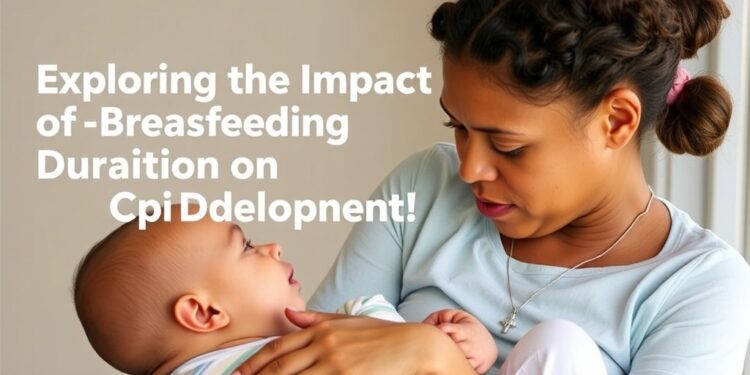Breastfeeding has long been heralded as a crucial component of infant nutrition, but recent findings suggest its impact may extend far beyond physical health. A new cohort study provides compelling evidence that exclusive or prolonged breastfeeding can significantly reduce the odds of developmental delays and language or social neurodevelopmental conditions in children. These findings underscore an integral facet of early child development, making a strong case for public health initiatives aimed at promoting breastfeeding among new parents and caregivers.
The implications of this research are profound. Over time, studies have affirmed and reconfirmed the numerous benefits of breastfeeding, aligning with the biological realities of human growth and development. In an era where developmental conditions are becoming increasingly common, the correlation between exclusive breastfeeding and positive neurodevelopmental outcomes presents a transformative opportunity. Inbal Goldshtein, PhD, the study’s corresponding author, emphasizes the importance of these findings in shaping parenting and policy discussions regarding child health.
Breastfeeding, particularly during the first year of life, offers critical nutrients that support brain development. The composition of breast milk is uniquely suited to meet the dynamic needs of developing infants, providing not just sustenance but also protective factors that bolster immune health. Research indicates that these factors can have lasting effects, potentially influencing everything from cognitive abilities to social functioning in later life. This latest study enriches our understanding of how early nutrition can serve as a protective buffer against developmental delays.
Moreover, the adverse effects of developmental disorders on both children and their families can be staggering. Social neurodevelopmental conditions, often characterized by difficulties in social interaction and communication, pose significant challenges not only for individuals but for society as a whole. The study’s assertions that exclusive breastfeeding may serve as a preventive measure is thus a vital consideration in the broader discourse on public health strategies.
In light of these findings, parents and caregivers are encouraged to consider the advantages of breastfeeding as a means of fostering optimal child development. However, it is not merely a personal choice but a significant public health concern. Addressing barriers that prevent effective breastfeeding, such as lack of support in healthcare settings and workplace challenges, is essential. Society must transform the conversation around breastfeeding from one of stigmatization to one of empowerment and education.
Importantly, these insights also highlight the necessity for healthcare providers to actively promote breastfeeding as a standard of care. Providing accurate information and resources can pave the way for parents to make informed choices, thereby increasing both the rates of breastfeeding and its duration. This collective movement toward better breastfeeding practices can ultimately lead to healthier future generations.
As research continues to evolve, it’s essential to remain vigilant about the varying cultural attitudes toward breastfeeding. Many cultures embrace breastfeeding as a communal practice, fostering environments where nursing is normalized and supported. In contrast, stigma in various societies can hinder mothers from nursing their children openly, which can negatively influence their decision to breastfeed at all. Cultural competence in healthcare is emergent, necessitating that professionals are trained not just in medical protocols but in the cultural sensitivities that surround infant feeding practices.
Moreover, the study encourages ongoing examination into the mechanisms behind the protective effects of breastfeeding. Is it the antibodies transferred through breast milk? The unique composition of nutrients tailored for brain health? Or perhaps it’s the mother-infant bonding that is enhanced through the act of breastfeeding? Understanding these elements will be crucial in future research that seeks to uncover the full implications of breastfeeding on child neurodevelopment.
In an age where developmental issues are increasingly common, integrating this research into community health policies is critical. Public health campaigns should emphasize the benefits of breastfeeding while ensuring accessible breastfeeding support, including education for expecting parents and ongoing lactation support postnatally. A multifaceted approach could significantly uplift breastfeeding practices, thereby contributing positively to children’s development.
Furthermore, the implications of the study extend beyond infancy. Optimal child development extends throughout life, influencing educational outcomes, self-esteem, and later social competence. Breastfeeding may play a pivotal role in setting the foundation for not just healthy babies but well-adjusted adults. A society that values and supports breastfeeding is, ultimately, one that invests in future generations.
Public health professionals, policymakers, and educators must collectively strive to implement initiatives aimed at increasing breastfeeding rates. Whether it’s through legislation that supports nursing mothers at work or public awareness campaigns that demystify breastfeeding, collective efforts can foster an environment where mothers feel empowered to undertake this viable option. For instance, creating spaces where women can comfortably nurse or providing resources on the importance of breastfeeding can shift societal perception and practice significantly.
In conclusion, the recent study highlights an essential link between exclusive breastfeeding and reduced developmental delays and language or social neurodevelopmental conditions. By advocating for breastfeeding, society can take meaningful steps in promoting the health and wellbeing of future generations. The choices we make regarding infant nutrition have far-reaching implications that deserve both attention and action.
Subject of Research: The Impact of Exclusive Breastfeeding on Developmental Delays
Article Title: Exclusive Breastfeeding Associated with Reduced Developmental Delays
News Publication Date: October 2023
Web References: For The Media
References: doi:10.1001/jamanetworkopen.2025.1540
Image Credits: JAMA Network Open
Keywords: Breastfeeding, Developmental Disorders, Early Childhood, Public Health, Nutrition, Neurodevelopment.




